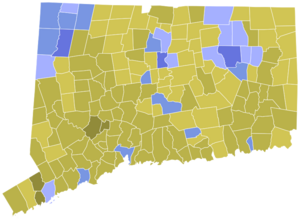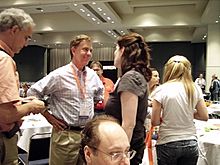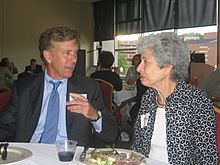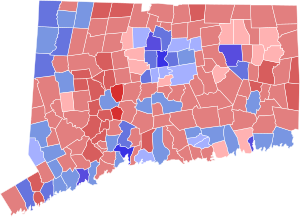Ned Lamont facts for kids
Quick facts for kids
Ned Lamont
|
|
|---|---|
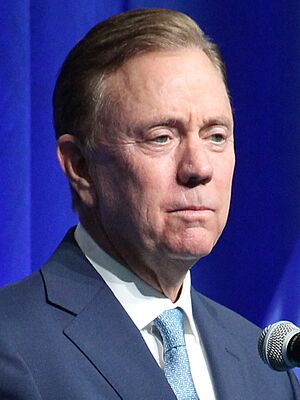
Lamont in his second term's inaugural address
|
|
| 89th Governor of Connecticut | |
| Assumed office January 9, 2019 |
|
| Lieutenant | Susan Bysiewicz |
| Preceded by | Dannel Malloy |
| Personal details | |
| Born |
Edward Miner Lamont Jr.
January 3, 1954 Washington, D.C., U.S. |
| Political party | Democratic |
| Spouse |
Ann Huntress
(m. 1983) |
| Children | 3 |
| Residence | Governor's Residence |
| Education | Harvard University (BA) Yale University (MBA) |
| Signature | |
Edward Miner Lamont Jr. (born January 3, 1954) is an American politician and businessman. He has been the 89th governor of Connecticut since 2019. He is a member of the Democratic Party. Before becoming governor, he served as a local official in Greenwich, Connecticut. He also ran for the United States Senate in 2006.
Lamont ran for governor in 2010 but did not win the Democratic primary. He ran again in 2018 and won the election, defeating Bob Stefanowski. He faced Stefanowski again in 2022 and won by an even larger amount. .....
Contents
Early Life and School
Ned Lamont was born on January 3, 1954, in Washington, D.C.. His mother, Camille Helene, was born in San Juan, Puerto Rico. His father, Edward Miner Lamont, was an economist. He worked on the Marshall Plan and in the government. Ned Lamont is related to important people like Thomas W. Lamont, who led J. P. Morgan & Co.
When he was seven, his family moved to Laurel Hollow, New York. He went to East Woods School with his two sisters. Later, he attended Phillips Exeter Academy, where he was the president of the student newspaper. After graduating in 1972, he studied sociology at Harvard College, earning a degree in 1976. He then earned a business degree from the Yale School of Management in 1980.
Professional Career
In 1977, Lamont worked as an editor for a small newspaper in Ludlow (village), Vermont, called the Black River Tribune. After finishing his studies at Yale, he started working in the cable television business.
In 1984, he started his own company, Campus Televideo. This company provided cable and satellite services to colleges across the country. He also led Lamont Digital Systems, a company that invested in new media businesses. Campus Televideo was the biggest part of this company until it was sold in 2015.
Lamont has also served on the boards of several organizations. These include the Conservation Services Group, Mercy Corps, and the Norman Rockwell Museum. He has also been on advisory boards for the Brookings Institution and the Yale School of Management.
Early Political Roles
Lamont was first elected as a local official, called a selectman, in Greenwich, Connecticut, in 1987. He served for one term. In 1990, he ran for the state senate but did not win. Later, he served three terms on the Greenwich town finance board. He also led the State Investment Advisory Council, which looks after state pension fund investments.
Running for U.S. Senate in 2006
On March 13, 2006, Ned Lamont announced he would run for the U.S. Senate. He was running against the current senator, Joe Lieberman. They debated on television about topics like the Iraq War and energy. Lamont said that Lieberman was too supportive of Republican policies. He told Lieberman, "if you won't challenge President Bush and his failed agenda, I will."
Lamont also criticized Lieberman for supporting a law called the "Bush–Cheney–Lieberman energy bill." Lieberman said he voted with other Democrats most of the time. Lamont funded most of his own campaign, spending over $12.7 million.
Lamont won the Democratic primary election with 52% of the votes. This was the only Senate race in 2006 where a current senator lost their party's nomination. After losing, Lieberman decided to run as an independent candidate. He ran under the name Connecticut for Lieberman. Lieberman then won the general election with almost 50% of the votes.
2008 Presidential Campaign
Lamont first supported Chris Dodd for president. After Dodd left the race, Lamont became a leader for Barack Obama's presidential campaign in Connecticut. Many people said that Lamont helped Obama win the Democratic primary in Connecticut. In March 2008, Lamont was a delegate for Obama at the 2008 Democratic National Convention.
Academic Career
Before the 2006 election, Lamont volunteered at Warren Harding High School in Bridgeport, Connecticut. He taught students about starting businesses and helped them find internships. After the election, he taught at the Harvard Institute of Politics and the Yale School of Management.
He then became a professor at Central Connecticut State University (CCSU). He was named a Distinguished Professor of Political Science and Philosophy. While at CCSU, he taught classes and started a business competition for students. In 2019, he gave the graduation speech at CCSU as governor.
Governor of Connecticut (2019–present)
Elections
2010 Election
On February 16, 2010, Lamont announced he would run for governor. He lost the Democratic primary to former Stamford mayor Dannel Malloy. Malloy then won the general election.
2018 Election
On January 17, 2018, Lamont announced he would run for governor again. He received his party's support and chose Susan Bysiewicz as his running mate. Lamont won the Democratic primary by a large amount. He then faced Republican Bob Stefanowski in the general election on November 6. Lamont won the election.
2022 Election
Lamont won reelection for his second term as governor, with Susan Bysiewicz as his running mate. He won the Democratic primary without anyone running against him. He defeated Stefanowski again in a rematch of their 2018 election. Lamont won by an even larger amount this time. He became the first Democrat to win a gubernatorial election by more than five points in Connecticut since 1986.
Administration
Ned Lamont became the 89th governor of Connecticut on January 9, 2019. When he took office, some of his main goals included:
- Adding electronic tolls on state highways.
- Taxing online streaming services.
- Bringing back a property tax credit.
- Increasing the minimum wage to $15 per hour.
- Starting paid family and medical leave.
- Legalizing sports betting.
- Improving train lines to make travel faster.
First Term (2019−2023)
In February 2019, Lamont appointed former PepsiCo CEO Indra Nooyi to help lead the Connecticut Economic Resource Center (CERC). This group works to improve the state's economy. In April 2019, Lamont signed his first executive order. It aimed to make state buildings and vehicles more energy-efficient. This helps reduce pollution and save money.
In June 2019, Lamont signed a law that banned the "gay panic defense" in Connecticut. He also signed three gun-control laws. One of these, Ethan's Law, requires guns to be stored safely in homes with children.
On June 26, Lamont signed his first state budget, which was about $43 billion. To balance the budget without raising income taxes, some state pension funds were changed. Money for transportation was cut, and some taxes and fees went up. However, the budget also increased funding for education and workforce training. It kept money for towns stable and put $2.2 billion into the state's emergency fund.
On March 8, 2020, Connecticut reported its first COVID-19 case. As cases grew, Lamont declared a public health emergency. He closed schools and non-essential businesses. He also issued a stay-at-home order and required face coverings in public. As cases went down, he lifted the stay-at-home order in May 2020.
In July 2020, Lamont signed a police reform bill. This law requires police officers to wear body cameras. It also bans certain police moves and creates a statewide group to watch for police misconduct. On December 15, 2020, the first person in Connecticut received the COVID-19 vaccine. Connecticut was the first state to vaccinate 50% of its adult population.
In May 2021, Lamont ended most of the state's COVID-19 restrictions. He also signed a bill to raise the state's minimum hourly wage to $15 by 2023. In May 2021, he signed a law to legalize online sports betting and gaming.
In June 2021, Lamont signed his second state budget, which was about $46 billion. This budget expanded health insurance for many people and increased the state's emergency fund to $4.5 billion. ..... On June 25, Lamont signed a law for a paid family and medical leave program. Starting in 2022, workers can take up to 12 weeks of paid time off for family or medical reasons.
In July 2021, Lamont signed a fee for large commercial trucks using highways. This money helps repair state roads. In October 2021, sports betting and online gaming officially started in Connecticut. Also in October 2021, WalletHub named Connecticut the safest state in the country during the pandemic.
.....
Second Term (2023−present)
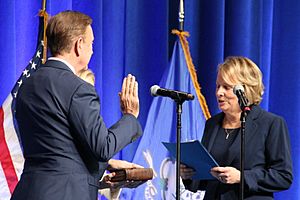
Lamont won his second term as governor in 2022. He was sworn in on January 4, 2023, along with Lieutenant Governor Susan Bysiewicz.
..... These laws protect medical providers from actions by other states if they provide reproductive services.
Approval Ratings
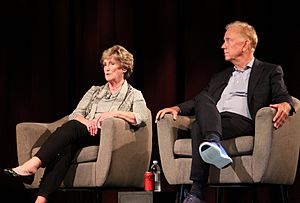
In his first year as governor, Lamont's approval ratings were low. However, since the pandemic began in 2020, his approval ratings have been higher. A May 2020 poll showed he had a 65% approval rating. People especially approved of how he handled the pandemic, with a 78% approval rating for that. By 2022, Lamont had the highest approval rating of any Democratic governor.
Personal Life
On September 10, 1983, Ned Lamont married Ann Huntress. She is a business investor. They have three children. He and his family live in Greenwich, Connecticut. They also have a vacation home in North Haven, Maine. The Lamont Gallery at Phillips Exeter Academy and the Lamont Library at Harvard University are named after his family.
See also
 In Spanish: Ned Lamont para niños
In Spanish: Ned Lamont para niños
- Electoral history of Ned Lamont


